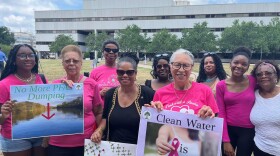The Environmental Protection Agency (EPA) announced plans Monday to regulate per-and polyfluoroalkyl substances (PFAS) — manmade "forever chemicals" found in many household products and North Carolina rivers.
The agency intends to establish and enforce national limits for PFAS in drinking water. The move comes after years of advocates calling for stronger PFAS rules.
“This is a bold strategy that starts with immediate action,” said Michael Regan, EPA Administrator and former secretary of the North Carolina Department of Environmental Quality (DEQ). “We’re going to use every tool in our toolbox to restrict human exposure to these toxic chemicals.''
Regan spoke at a press conference Monday afternoon at North Carolina State University’s Centennial Campus in front of Lake Raleigh. Governor Roy Cooper, current DEQ secretary Elizabeth Biser, and other state and local officials also attended the press conference.
There are thousands of different kinds of PFAS. The chemicals can be found in water resistant clothing, non-stick cookware, shampoo, fast food wrappers, and many other consumer products. It’s been linked to several health effects, including increased cholesterol levels and a higher risk for some cancers.
In North Carolina, PFAS has been found in the Cape Fear and Haw rivers, which provides drinking water for hundreds of thousands of people. Last November, an ongoing study from Duke University found Pittsboro residents - whose drinking water source is the Haw River - with PFAS chemicals in their blood at levels 2-to-5 times higher than the general U.S. population.
Under the new plan, the EPA will mandate PFAS manufacturers to disclose how toxic their chemicals are. That information will be used to inform and create new regulations.
"Under the Safe Drinking Water Act, we have the tools to demand better disclosure," Regan said to reporters. "We’re going to work with states to ensure that none of these polluters get discharge permits to continue to put this stuff in the air and water. [Chemical companies have] alluded the federal oversight for far too long. They will no longer be able to."
The plan also calls for accelerating the cleanup of contamination, in part by placing that responsibility on polluters. The agency will designate certain PFAS as hazardous substances under the so-called Superfund law that allows the EPA to force companies responsible for the contamination to pay for the cleanup work or do it themselves.
Additionally, the EPA wants to invest more money into research about PFAS. President Biden’s infrastructure package proposes more than $10 billion in grants to address and research PFAS. The measure is still working through Congress.
"As we continue partnering with the EPA on this and other important efforts, it's critical that Congress pass the bipartisan infrastructure deal, and the larger budget resolution that includes funding to tackle PFAS contamination," Cooper said.

Legislation passed by the U.S. House would set a national drinking water standard for PFAS and direct the EPA to develop discharge limits for a range of industries suspected of releasing PFAS into the water. The bill has stalled in the Senate.
Meanwhile, North Carolina environmental organizations are welcoming the EPA's plan. Geoff Gisler, senior attorney at the Southern Environmental Law Center, said in an interview that the plan is a big step forward.
"I’m very encouraged to see… that the EPA [is] going to use their existing authority. Under the Clean Water Act… PFAS are regulated," Gisler said. "The EPA and state agencies just haven't been holding dischargers accountable. So what EPA has said in this plan is that they're going to make clear that this is the law."
Gisler added he feels confident that the steps outlined will help people who've been impacted by PFAS pollution.
"What I think this means for communities across North Carolina is that whether you're a town of 5,000 people, or a city of a million people, you're going to get protection under the Clean Water Act," Gisler said.
In a statement, chemical company Chemours said it looks forward to working with the EPA.
“We believe the voluntary stewardship program recommended by the agency could help achieve meaningful progress in reducing emissions while several of the initiatives work their way through the regulatory process,” Chemours said in an email.
Chemours' manufacturing facility in Fayetteville is responsible for discharging GenX, a type of PFAS, into the Cape Fear River for several years. Under its agreement with DEQ, the company must remove the pollution from the water. Most recently, DEQ fined Chemours over $300,000 for exceeding its facility's limit on GenX air emissions.
In a separate statement, the American Chemistry Council, a lobbying organization that represents over 150 chemical companies, said it supports the EPA’s plan, as long as it is “consistent with sound science.”
“All PFAS are not the same, and they should not all be regulated the same way. Each [has] its own unique properties and uses... for which alternatives are not always available,” the organization said.
The EPA’s testing mandate for companies will start this fall. Regan said he hopes to have PFAS regulations passed into law by 2023.
The Associated Press contributed to reporting in this story.







